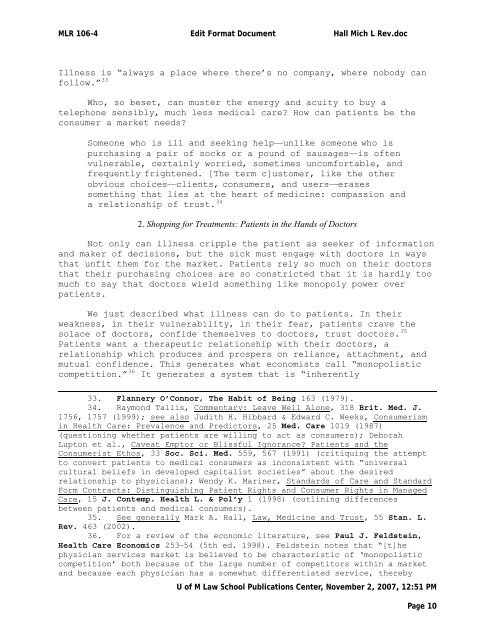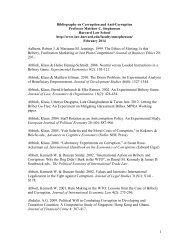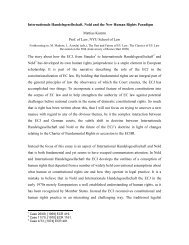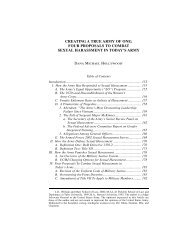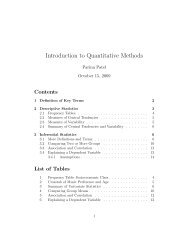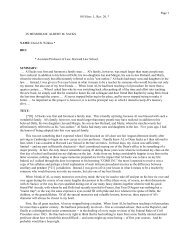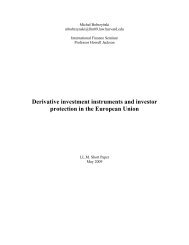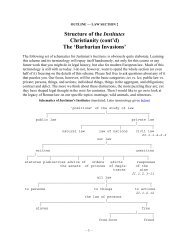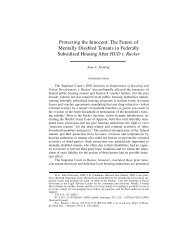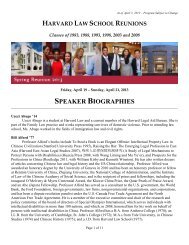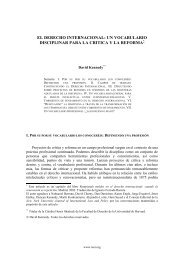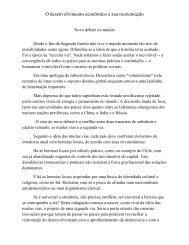Patients as Consumers - Harvard Law School
Patients as Consumers - Harvard Law School
Patients as Consumers - Harvard Law School
Create successful ePaper yourself
Turn your PDF publications into a flip-book with our unique Google optimized e-Paper software.
MLR 106-4 Edit Format Document Hall Mich L Rev.doc<br />
Illness is “always a place where there’s no company, where nobody can<br />
follow.” 33<br />
Who, so beset, can muster the energy and acuity to buy a<br />
telephone sensibly, much less medical care? How can patients be the<br />
consumer a market needs?<br />
Someone who is ill and seeking help—unlike someone who is<br />
purch<strong>as</strong>ing a pair of socks or a pound of sausages—is often<br />
vulnerable, certainly worried, sometimes uncomfortable, and<br />
frequently frightened. [The term c]ustomer, like the other<br />
obvious choices—clients, consumers, and users—er<strong>as</strong>es<br />
something that lies at the heart of medicine: comp<strong>as</strong>sion and<br />
a relationship of trust. 34<br />
2. Shopping for Treatments: <strong>Patients</strong> in the Hands of Doctors<br />
Not only can illness cripple the patient <strong>as</strong> seeker of information<br />
and maker of decisions, but the sick must engage with doctors in ways<br />
that unfit them for the market. <strong>Patients</strong> rely so much on their doctors<br />
that their purch<strong>as</strong>ing choices are so constricted that it is hardly too<br />
much to say that doctors wield something like monopoly power over<br />
patients.<br />
We just described what illness can do to patients. In their<br />
weakness, in their vulnerability, in their fear, patients crave the<br />
solace of doctors, confide themselves to doctors, trust doctors. 35<br />
<strong>Patients</strong> want a therapeutic relationship with their doctors, a<br />
relationship which produces and prospers on reliance, attachment, and<br />
mutual confidence. This generates what economists call “monopolistic<br />
competition.” 36 It generates a system that is “inherently<br />
33. Flannery O’Connor, The Habit of Being 163 (1979).<br />
34. Raymond Tallis, Commentary: Leave Well Alone, 318 Brit. Med. J.<br />
1756, 1757 (1999); see also Judith H. Hibbard & Edward C. Weeks, Consumerism<br />
in Health Care: Prevalence and Predictors, 25 Med. Care 1019 (1987)<br />
(questioning whether patients are willing to act <strong>as</strong> consumers); Deborah<br />
Lupton et al., Caveat Emptor or Blissful Ignorance? <strong>Patients</strong> and the<br />
Consumerist Ethos, 33 Soc. Sci. Med. 559, 567 (1991) (critiquing the attempt<br />
to convert patients to medical consumers <strong>as</strong> inconsistent with “universal<br />
cultural beliefs in developed capitalist societies” about the desired<br />
relationship to physicians); Wendy K. Mariner, Standards of Care and Standard<br />
Form Contracts: Distinguishing Patient Rights and Consumer Rights in Managed<br />
Care, 15 J. Contemp. Health L. & Pol’y 1 (1998) (outlining differences<br />
between patients and medical consumers).<br />
35. See generally Mark A. Hall, <strong>Law</strong>, Medicine and Trust, 55 Stan. L.<br />
Rev. 463 (2002).<br />
36. For a review of the economic literature, see Paul J. Feldstein,<br />
Health Care Economics 253–54 (5th ed. 1998). Feldstein notes that “[t]he<br />
physician services market is believed to be characteristic of ‘monopolistic<br />
competition’ both because of the large number of competitors within a market<br />
and because each physician h<strong>as</strong> a somewhat differentiated service, thereby<br />
U of M <strong>Law</strong> <strong>School</strong> Publications Center, November 2, 2007, 12:51 PM<br />
Page 10


